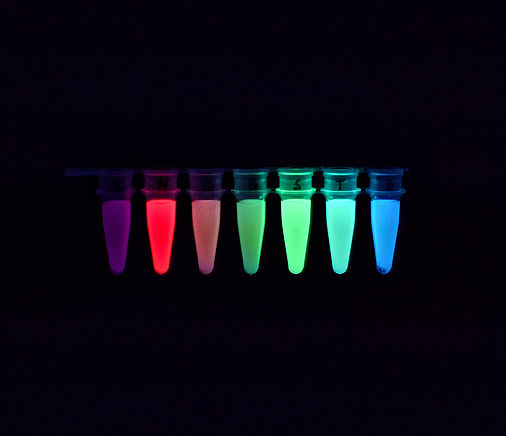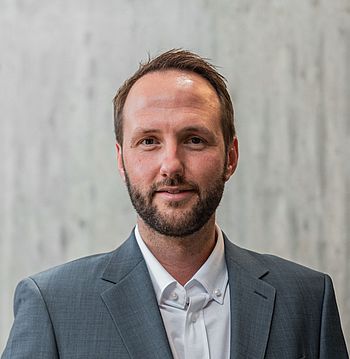UR researcher receives ERC Starting Grant
Prof. Dr. Markus Jeschek investigates novel biosensors
5 Sept 2023
The European Research Council (ERC) is funding the research project "Biosensing by Sequence-based Activity Inference" (BiosenSAI) of the Regensburg Professor of Synthetic Microbiology, Prof. Dr. Markus Jeschek, with an ERC Starting Grant. The project will be funded with 1.5 million euros over a period of five years. A second Starting Grant goes to Prof. Dr. Claudius Zibrowius, Faculty of Mathematics at UR, for his project "Cut-and-paste conjectures and multicurves (CAPCAM)", with which Prof. Zibrowius has meanwhile moved on to the University of Durham in the UK.
"The ERC funding will make a significant contribution to positioning the research of the still young Professorship of Synthetic Microbiology in an internationally competitive way and thus to the recruitment of international students and scientific staff," says Prof. Dr. Markus Jeschek. This will not only have a positive impact on the immediate project, but also contribute to the international visibility of the excellent teaching and research at University of Regensburg, Jeschek continues. He puts the ERC Starting Grant into context within the overall concept of the university: "The successful acquisition of the prestigious early career grant speaks for the attractiveness of Regensburg as a research hub. As a positive example, the project can thus make a valuable contribution to the recruitment of excellent young scientists to our faculty and the UR in the face of increasing international competition. BiosenSAI exquisitely aligns with the UR's mission and development plan with central goals such as sustainability, internationalisation, interdisciplinarity and the promotion of young researchers".
About the BiosenSAI project
BiosenSAI deals with the data-driven development of novel biosensors consisting of proteins or RNA, which can be used for the facile detection of industrially relevant product molecules (e.g. basic chemicals, flavours/fragrances). Biosensors can "detect" the product of interest and visualize it via, for instance, fluorescence. If a biosensor is able to detect a desired product, it can be used to search for new microbial production strains that can produce this very product from renewable resources. Therefore, such biosensors can be viewed upon as key enablers of sustainable bioprocesses that can replace conventional petroleum-based production. To revolutionise the development of new biosensors, BiosenSAI builds upon proprietary high-throughput technology developed in Prof. Jeschek's team, which allows to gain a substantiated knowledge about the function of biosensors and thus model their behaviour with high precision by machine learning. The unique combination of experimental methodology with artificial intelligence will enable the computer-aided design of novel biosensors quasi "à la carte" under the framework provided by the ERC funding.
For this purpose, an interdisciplinary approach is being pursued that combines cutting-edge molecular biology methods (e.g. next-generation sequencing) with machine learning. The developed biosensors have various applications in sustainable chemistry and medicine resulting in diverse opportunities for collaboration with the faculties of informatics and data science, chemistry and medicine. Further, the developed concepts and sustainable production processes have a high potential for research transfer to industry and thus various possible implications for society.

Biosensors can detect product molecules and emit easy-to-read fluorescent signals in different colours. © Daniel Gerngross
About the ERC Starting Grants
The ERC Starting Grants are prestigious grants for outstanding research projects worth up to 1.5 million euros. It is awarded annually to scientists who are still at the beginning of their careers. The money is used, among other things, to set up an academic working group for the respective award-winning research project.
Bavaria's Minister of Science Markus Blume congratulates: “Great scientific careers begin in Bavaria: 17 renowned ERC Starting Grants go to the Free State. This is a mark of excellence and, above all, of our universities' work with young researchers. The awarded projects are top-class and show: Research pioneers are at home in Bavaria. I am particularly pleased that the University of Regensburg was able to land two of the prestigious awards. In Bavaria, we have a top-level research infrastructure. With the High-Tech Agenda Bavaria, we are expanding this further - a total of 5.5 billion euros will ensure ideal conditions. Congratulations to all the award winners and the successful universities.”
About the ERC
The ERC, set up by the European Union in 2007, is the premier European funding
organisation for excellent frontier research. It funds creative researchers of any nationality and age, to run projects based across Europe. The ERC offers four core grant schemes: Starting Grants, Consolidator Grants, Advanced Grants and Synergy Grants. With its additional Proof of Concept Grant scheme, the ERC helps grantees to bridge the gap between their pioneering research and early phases of its commercialisation. The ERC is led by an independent governing body, the Scientific Council. Since November 2021, Maria Leptin is the President of the ERC. The overall ERC budget from 2021 to 2027 is more than €16 billion, as part of the Horizon Europe programme, currently under the responsibility of European Commission Executive Vice President Margarete Vestager.

Prof. Dr. Markus Jeschek © Julia Dragan
Information/Contact
Prof. Dr. Markus Jeschek
Chair of Microbiology & Archaea Centre
University of Regensburg
Phone: +49 (0)941 943 3160
E-Mail: markus.jeschek@ur.de




